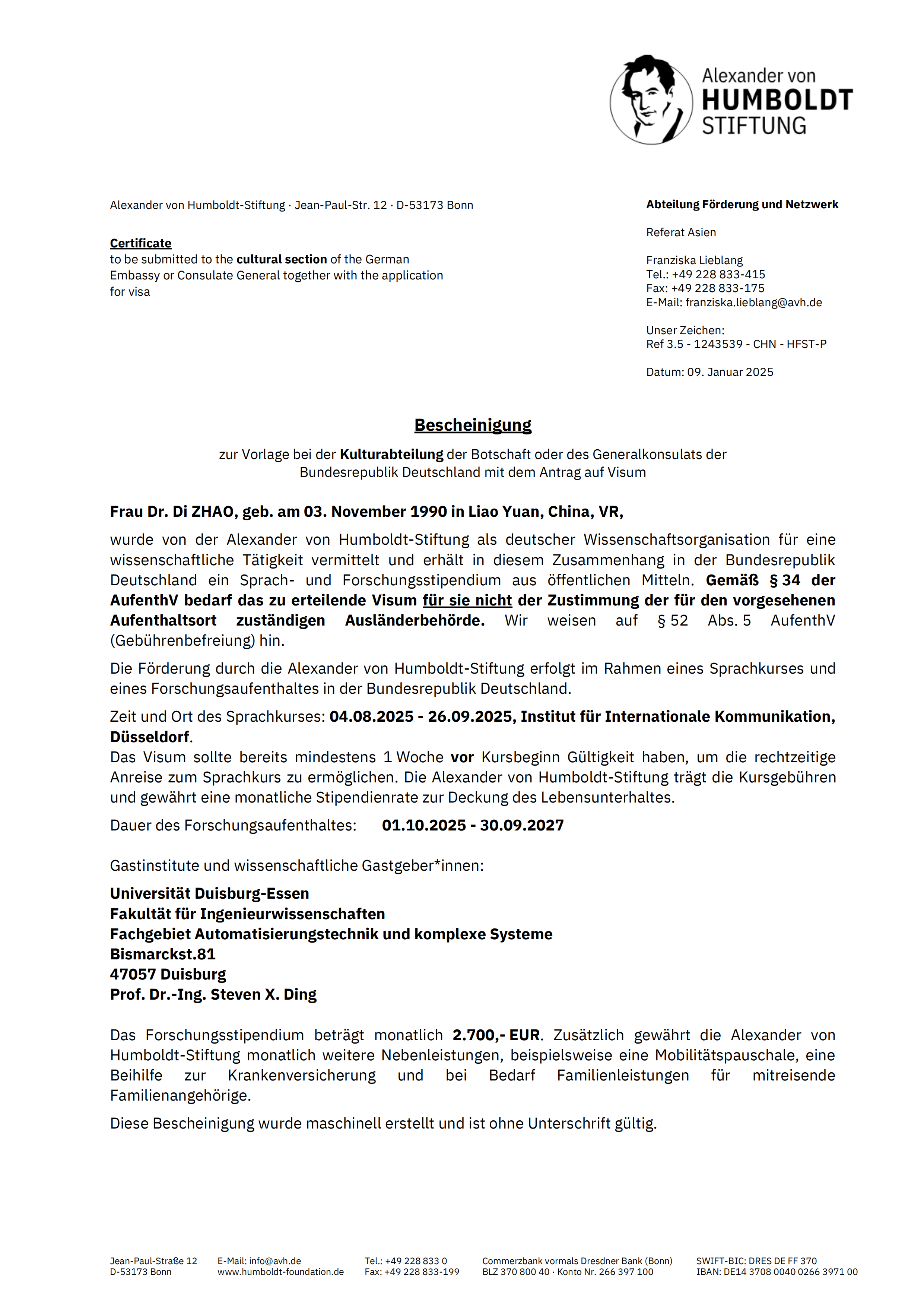On January 9, Alexander von Humboldt Foundation sent an official authorization letter to Zhao Di, Associate Researcher of the Department of Systems Science of the Business School, who was selected as a ‘Humboldt Research Fellowship’ of the Humboldt Foundation and would receive financial support from the Humboldt Foundation. The invited partner of this project is Professor Steven X. Ding of the University of Duisburg-Essen, Germany.
Based on this project, Zhao Di will go to Germany from August 2025 to September 2027 to conduct a systematic scientific research entitled ‘Proportional-Integral-Type State and Fault Estimation for Networked Dynamical Systems’. The research focuses on the analysis and synthesis of complex dynamic systems, and is dedicated to solving the key and difficult problems in the performance analysis and optimization of networked dynamic systems. Also, it can promote the development and improvement of the theoretical research on complex dynamic systems, and further broaden the international cooperation, as well as enhance the academic reputation and international influence of the School.
The Business School has always attached great importance to the training of young faculty members, providing them with abundant academic resources and international cooperation platforms. Especially in recent years, the School has helped young scholars by facilitating international academic exchanges and other initiatives. The approval of this grant is not only an academic recognition of our individual faculty members, but also a positive demonstration of the School in the international academic arena. In the future, the School will continue to provide a broader development platform for the growth of young scholars, and cultivate more excellent scientific research talents with international vision and innovation ability.

【Related information】
Faculty Member
Zhao Di, Associate Researcher and Master's Supervisor, Department of Systems Science, Business School. She graduated from University of Shanghai for Science and Technology with a PhD in July 2020, and was invited to City University of Hong Kong for collaborative research from March to June 2018, and went to Brunel University of London (UK) from November 2018 to November 2019 with the financial support from China Scholarship Council (CSC). Her main research interests are performance analysis and optimization of complex dynamic systems, PID control and PI estimation of information physical systems. In recent years, she has presided over a number of scientific research programs such as the National Natural Science Foundation of China (NSFC) Youth Program and the Shanghai Post-doctoral Excellence Program, and has participated in several Key Programs and General Programs of the NSFC. She has also won the Natural Science Award of Chinese Association of Automation.So far, she has published more than 30 papers in Automatica, IEEE Transactions on Automatic Control, IEEE Transactions on Cybernetics, IEEE Transactions on Systems, Man, and Cybernetics: Systems, and other important journals in her field. She has also been honored with the title of ‘Outstanding Reviewer’ in international journals such as Neuro computing and Procedia Computer Science.
Alexander von Humboldt Foundation
The Humboldt Foundation, founded in 1860 and named after Alexander von Humboldt, the German natural scientist and scientific traveler, is one of the most prestigious scientific foundations in the world. The Humboldt Foundation provides annual funding for outstanding young scientists and scholars worldwide. The “Humboldt Research Fellowship” is a life-long honor and is one of Europe's three most prestigious programs of excellence, along with the Marie Skłodowska-Curie Actions of the European Union and the Newton International Fellowships in the United Kingdom. The Humboldt Research Fellowship is selected through a rigorous selection process, in which a selection committee of about 100 German scientists from various disciplines discusses and votes on the shortlisted applicants, with the sole criterion being whether the applicant has an outstanding academic level and research ability. To date, more than 50 Humboldt Scholars have been awarded the Nobel Prizes.
Translated by Wei Xin
Reviewed by Liu Weiwei


